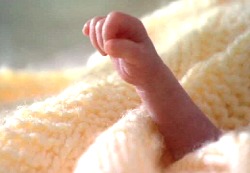 “I ain’t turning no machine off” said Kelly, as if she was a teenager talking about shutting down her Playstation. In fact, she was a mother talking about turning off the life support for her very premature baby.
“I ain’t turning no machine off” said Kelly, as if she was a teenager talking about shutting down her Playstation. In fact, she was a mother talking about turning off the life support for her very premature baby.
And so it was that last night’s BBC2 documentary 23 Week Babies: the Price of Life exposed one of the central dilemmas at the heart of the medical and ethical minefield that is whether to resuscitate very premature babies. Kelly was clearly up for not turning no machines off. Whether she was up for understanding, let alone navigating, the medico-moral minefield was another matter altogether. She hadn’t even in fact been asked to turn no machine off, only what her views were on aggressive resuscitation should her baby take a turn for the worst. The program’s presenter, Adam Wishart – a thoughtful cove whose brief onscreen appearances featured averted eyes, even if the eyes of his cameras probed mercilessly – asked: is it right to place such a burden of responsibility on the parents?
In the past, such treatment decisions were chiefly made by doctors, sometimes with scant regard to the wishes of the parents. ‘Doctor knew best’, and the doctor would guide the decision-making and care in the way he or she felt was best for his or her infant patient. The parents would properly be kept informed, and involved as far as practicable, but their decision-making role was largely passive – to be the receivers of good or bad news, rather than take an active part in the decision-making.
More recently, the rise in consumerism, indeed informed ‘choice-ism’, and a general distaste for medical paternalism, have shifted decision-making to a more consensual model. Almost all of the time, this is a good thing. But when the patient is a very premature baby, on the cusp of viability, and yet the person being offered an ocean of options and choices – and the unavoidable responsibility attached to them – is a parent in the most unimaginable anguish, and consumed by the powerful urge of parental love, are we perhaps taking shared decision-making a share too far?
Certainly Kelly, and Simon, the father of their 23 week daughter Simone, appeared overwhelmed. In their turmoil, both seemed to equate any consideration of whether to resuscitate Simone with a request that they personally turn off her ventilator; such that they would then be personally responsible for her death. And that is an intolerable burden no parent should ever have to contemplate, let alone bear.
Some no doubt will observe that neither parent – who between them already had nine other children – seemed to have the Oxbridge air about them. And in a way, that is precisely the point. Neither had asked to be flooded with facts, to be burdened with the weight of decision, or to carry the baton of responsibility for deciding the fate of their child – for them it was a simple matter of wanting their baby to have the best chance of life. And while such a view may lack the subtlety of an Oxbridge dissertation, who can deny them their honest position?
Dr No can’t help wondering whether the politically correct tick-box drive to be inclusive, to involve all parents in all decisions at every stage, whether they want it or not, risks for some becoming intrusive. Sure, those who want full involvement at every stage should have it. But it does seem more than a bit harsh to force those parents unable or unwilling to climb the moral mountain and achieve detachment through that painful mill.
There are echoes here at the other end of life, in the modern habit of inviting unsuspecting old folk to contemplate their own demise – and then popping a Advance Directive to Refuse Treatment under their nose. Such habits, it seems to Dr No, lay the doctor open to charges of a sly abdication of clinical responsibility: because for some patients and parents, doctor really does know best. And for those patients and parents, it is sufficient to know that the doctor has done his or her dutiful best – whatever the outcome.
